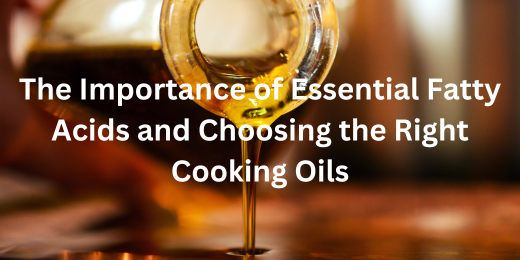
The Importance of Essential Fatty Acids and Choosing the Right Cooking Oils
Essential fatty acids
Consuming Assortment of Oils and Fats
A balanced diet requires incorporating a variety of oils and fats to ensure optimal health and nutrition. Including diverse sources like nuts, legumes, and seeds supports the intake of essential fatty acids needed for bodily functions. Maintaining lipid balance is vital for overall well-being and long-term physical health.
Relying on multiple sources of healthy cooking oils can improve lipid intake and enhance nutritional balance in daily meals. Using natural oil sources is a healthier choice over highly processed oil. This approach helps to manage fat consumption and encourages healthier eating habits for everyone.
Limiting processed oils and focusing on natural options provides healthy fats for weight loss and general well-being. Additionally, consuming the best sources of omega-3 fatty acids supports heart health and brain function. Moderation is key, as it helps maintain optimal lipid intake and reduces unnecessary consumption of harmful fats.
Types of Fatty Acids in the Diet
Meat, dairy, and some processed foods are examples of animal products that frequently include saturated fatty acids. Consuming these fats in high amounts increases the risk of heart diseases and related health issues. A balanced diet helps maintain appropriate levels of essential fatty acids, promoting better cardiovascular and overall health.
Monounsaturated fatty acids are beneficial for protecting the body against various cardiovascular diseases and reducing clot formation. They are present in several healthy cooking oils, such as olive oil, which is recommended for daily use. This type of fat supports long-term heart health and improves overall circulation.
Omega-3 and omega-6 polyunsaturated fatty acids in particular are essential for maintaining brain function, fostering cellular health, and enhancing general physiological well-being. Consuming the best sources of omega-3 fatty acids helps to maintain cognitive function and cell integrity. Including healthy fats for weight loss further aids in maintaining a balanced and nutritious diet.
Role of Fats in Human Physiology
With 9 Kcal per gram, fats are a substantial energy source that greatly increases the energy composition of foods. Including healthy fats for weight loss ensures energy needs are met while maintaining optimal body composition. Choosing quality fats also supports sustainable energy for physical and mental activity throughout the day.
Lipids play a critical role in hormone production and cellular signalling, contributing to proper body function. Foods rich in essential fatty acids are essential for maintaining these hormonal functions effectively. Balancing different fat sources ensures overall hormonal balance and long-term physiological health.
Fat also facilitates the absorption of fat-soluble vitamins, crucial for maintaining good health. Using healthy cooking oils in meals promotes better absorption of vitamins like A, D, E, and K. Ensuring a varied intake of oils supports essential vitamin functions and enhances overall well-being.
Health Implications of Excessive Fat Consumption
Excessive consumption of saturated fats increases cholesterol levels, contributing to heart disease and other cardiovascular issues. It is important to limit foods high in these unhealthy fats for improved overall health. Opting for healthy cooking oils helps reduce the risk of cardiovascular disease while promoting a balanced diet for the long term.
Saturated fats can also affect insulin sensitivity, leading to potential risks for developing type 2 diabetes. High levels of unhealthy fats in the diet can reduce the body’s ability to process sugar effectively. Incorporating healthy fats for weight loss may help regulate metabolism and improve insulin sensitivity.
Trans fats, found in many processed foods, are linked to various health risks, including cancer and diabetes. They are harmful due to their negative impact on cholesterol and inflammation. Selecting foods that are high in essential fatty acids and the greatest providers of omega-3 fatty acids can help avoid disease and promote heart health.
Sources of Healthy Fats
Mustard, flaxseed, and soyabean oils are some of the healthy cooking oils rich in polyunsaturated fats. These oils provide beneficial fats that support heart health and reduce bad cholesterol levels. Including these plant-based oils in regular meals can help the body’s general health and diet.
Nuts and seeds that are high in good fats for weight loss include fenugreek seeds, walnuts, and almonds. Rich in omega-3 and omega-6, they contribute significantly to brain function, enhance heart health, and support overall well-being by providing essential nutrients. Including these nutrient-dense foods in the diet provides valuable energy and essential nutrients for long-term benefits.
Marine fish such as salmon, mackerel, and tuna are excellent sources of omega-3 fatty acids, providing essential nutrients that support heart health and overall well-being in a balanced diet. These fish provide long-chain polyunsaturated fats, including DHA and EPA, vital for heart and brain health. Including these fatty fish in meals ensures a rich supply of essential fatty acids for optimal wellness.
Guidelines for Using Cooking Oils
To maintain good health, it is essential to limit visible fats, including healthy cooking oils, to 20-50g daily. Excessive consumption of oils, even healthy ones, can contribute to weight gain and other health concerns. Keeping oil use within recommended limits ensures a balanced intake of essential nutrients and fats.
Reusing cooking oils can generate harmful substances that increase the risk of developing heart disease and cancer, highlighting the importance of using fresh oils for healthier meal preparation. It is important to avoid reheating oils to prevent dangerous byproducts from forming. Incorporating fresh oils, rich in essential fatty acids, can reduce these risks and support better overall health.
Choosing unrefined, cold-pressed oils preserves valuable antioxidants and nutrients, benefiting overall well-being. These oils are more nutritious compared to heavily processed alternatives, making them ideal for everyday cooking. Including such oils in moderation can offer healthy fats for weight loss and promote long-term health benefits for individuals.
For premium Uyir Organic Cold Pressed Oils, a wide range of organic food products, and eco-friendly fertilisers, visit the nearest Uyir Organic Farmers Market or explore online at www.uyironline.in or www.uyirorganic.farm.